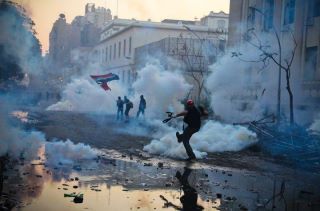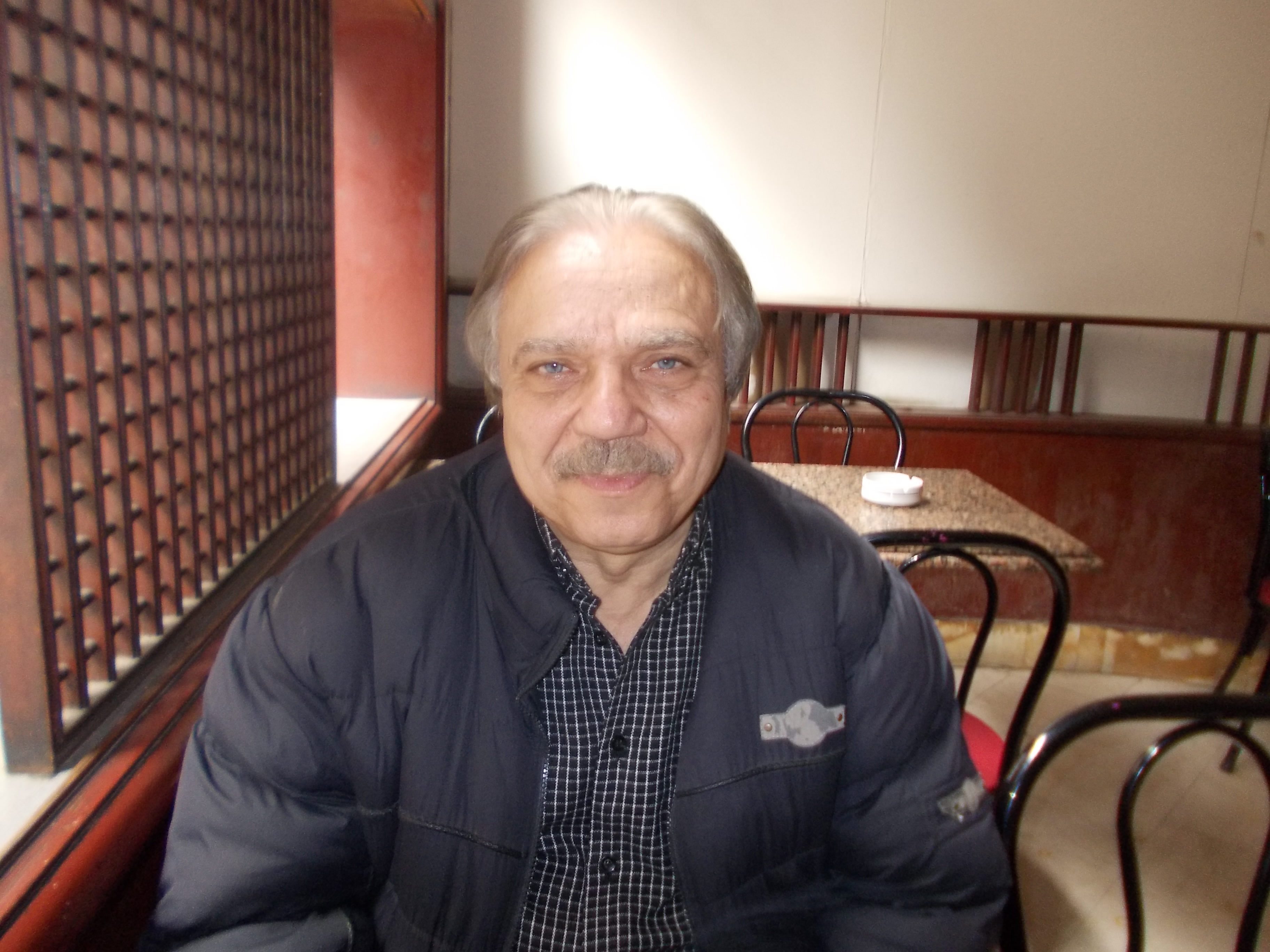It was the second time I visited Cairo. The first was last October, with my dear comrade Pedram Shayar. On October we witnessed the massacre of the Copts at Maspero, in front of the state television building. We also met with several activists of the “revolutionary youth”. The general political atmosphere was not so warm for the Egyptian revolutionaries. The reaction of Egyptian society to the Maspero massacre was relatively weak and only few thousands were participating in Tahrir’s Fridays. Pedram summarized the experience in a sentimental article called “Arab autumn”. Three months later, the situation seemed quite different.
The first anniversary of the revolution
Just few days before the first anniversary of the Egyptian revolution, it was pretty obvious that January 25, 2012 would have been a political event of major significance. The January 25 mobilization in Tahrir square would have reflected the main dilemma that Egyptian society faces right now: should the revolution be continued until all its demands to be fulfilled, or the best alternative is to find a compromise with the de facto ruling Supreme Council of Armed Forces (SCAF)?
Those who believe in the continuation of the revolution (the so called “revolutionary youth”) called Egyptians to make of January 25 a day of re-launching the revolution. On the other hand, SCAF and Muslim Brotherhood (which had just won the 47% of seats in the newly elected Parliament) called Egyptians to celebrate the victory of the revolution. In order to make it a real celebration day, Government declared January 25 a national holiday. On the other hand, revolutionaries made a huge campaign to mobilize people under the banner of immediate end of military rule . For revolutionaries, January 25 was a great opportunity to regain massive social support.
On October, especially after Maspero massacre, revolutionary youth seemed to be isolated. But on November, after the huge mobilization in Tahrir and the bloody clashes in Mohamed Mahmoud str, revolutionaries went again in the game. For the first time that a huge part of Egyptian population started to turn against military rule. And then, on December, after parliamentarian elections and the clashes in front of the Cabinet building, it seemed that society was turning again its back to revolutionary youth. So the first anniversary of the Egyptian revolution would have symbolized either the complete hegemony of the conservative forces, or the vitality and popularity of revolutionary youth.
“This is a revolution, not a celebration”
At the evening of January 25 all the activists I spoke with, were enthusiastic. Everybody agreed on the evaluation of the anniversary. It was definitely a victory for the revolutionaries. First of all, popular participation exceeded even the most optimist expectations. Hundreds of thousands flooded the streets of Cairo and all the major cities of Egypt. It was said that this mobilization was bigger than the one of January 28, 2011, which marked a turning point of Egyptian revolution. In addition to massive participation, revolutionary political platform was absolutely hegemonic. “This is a revolution, not a celebration” and “Down with military rule” were the main slogans of the crowd. The general mood was definitely that of a popular demonstration, not an official celebration.
I followed the demo from Mostafa Mahmoud mosque to Tahrir, and I was quite impressed seeing a huge number of obviously religious people chanting the slogans of revolutionary youth and not those of Muslim Brotherhood. Later in Tahrir, the political battle over hegemony continued. There were two stages. The one was controlled by the Brotherhood. The other was the one of revolutionary youth. On the one stage, celebration tone and verses from Quran. On the other stage, revolutionary slogans and radical speeches against SCAF. At least once, activists approached the Brotherhood stage shouting “Liars!”. It was quite obvious in Tahrir that “Ihkwan” (the Brothers) were not able to control this movement.
Looking for a compromise between Brotherhood and SCAF
t is evident that Muslim Brotherhood is looking for a compromise with SCAF. Not only it agreed with SCAF the whole process of power transfer after the fall of Mubarak, but it also doesn’t participate in pro-democracy mobilizations. I was told that the Brotherhood chose not to break with the military because:
1.It has the fear of a military crackdown (like the one on the Brotherhood’s uprising in 1954).
2.It estimates that the continuation of the unrest in the streets will give space to more radical fractions of the movement, like the Left and the radical democrats.
3.It believes that it can dismantle military power step by step by controlling the new government.
SCAF wants three conditions to be satisfied in order to accept transferring the power to a civilian government:
1.The army should be recognized as the ultimate safeguard of the new Constitution. That will give the army the constitutional right to declare war and state of emergency.
2.Military budget should not be accountable to the Parliament. Furthermore, there should be no public control on army’s business (army’s business represent 40% of the Egyptian economy).
3.All the army personnel should have total immunity from crimes against protesters.
In brief, Egyptian army wants a Pakistan like “democracy” to be imposed on Egypt. This is a regime in which although some civil liberties are recognized, the real power is in army’s hands. On February 11, 2011, the military regime was forced to sacrifice Mubarak under the pressure of Tahrir uprising and a national wave of strikes. Nevertheless, the generals, under the leadership of field marshal Mohammed Tantoui, are still not willing to accept a real transfer of power to civilian rule.
It is widely believed that Muslim Brotherhood will accept one way or another the army conditions. In addition to that, Brotherhood sends the message to USA and Egyptian Capital that it is a responsible moderate political movement. After an unprecedented meeting the No2 of State Department William Burns, Brotherhood affirmed that it will respect Camp David treaty and that it will continue Mubarak’s economic policies. USA, which traditionally have a big influence on Egyptian politics, don’t have any problem with an Islamic government, as long as it doesn’t break with neoliberal framework and it doesn’t threat Israel. Besides that, Muslim Brotherhood confirmed its commitment to the protection of Egyptian tourism. That means there will be no effort to ban alcohol or bikinis in Egyptian tourist destinations.
Nevertheless, a compromise with SCAF is not an easy task for the Brotherhood. Accepting SCAF conditions creates anger among activists and dissatisfaction to that part of Brotherhood’s voters who are in favor of democratization process. Respecting Camp David might be difficult to be accepted by the militants of Brotherhood who were demonstrating for years against Israel. Cultivating good relationship with Egyptian tourist industry may open the space for the Salafi Nour party, whose coalition obtained a spectacular 24% of the seats. And not changing Mubarak’s economic policies means in reality that nothing will be done to decrease the immense poverty of Egyptian society. Revolution was not only about democracy, but also about bread.
Obviously Muslim Brotherhood has an impressive competence in political maneuvers. But the task remains difficult even for them.
Revolutionary youth demands immediate transfer of power
The term “revolutionary youth” signifies tenths of organizations which made the initial call for the Tahrir mobilization and organized the battle against Mubarak regime. The most important seems to be April 6 Movement, but none of them have more than some hundreds members. Nevertheless, they have an impressive power of mobilization and exercise critical influence to Egyptian politics. Some of their features are similar to Western Occupy movements: insistence on direct action, mistrust to political parties, strong democratic culture, secularism. On the contrary, they have some other characteristics which are probably linked to the specific political tradition of Egypt: patriotism, strong participation of liberal democrats in the heart of the movement, consideration of fighting against corruption as high priority, strong sensibility about Palestinian issue (without the wish of military escalation with Israel). It didn’t seem to me that revolutionary activists are the most poor of Egyptian society. On the other hand, the huge political events they create, they seem to be the only existing framework in which the socially excluded can find space to express their demands. Leftist activists (especially from Socialist Popular Alliance and Revolutionary Socialists) have a fundamental role in this movement. Nevertheless, the political agenda of the movement is still basically democratic, not leftist. Revolutionary youth fights of course for “social justice” and “bread”, but they are not very clear what they mean by that, in terms of a concrete political program. On the contrary, they are very clear on the question of democracy: immediate transfer of power to civilian rule, democratic Constitution which will not exclude women or Christians, new fair electoral law which will ban from election all the former cadres of Mubarak party, punishment of the police and army stuff who killed or injured protesters, end of emergency law and military trials for civilians.
As time goes by, activists realize that the endless sit-in in Tahrir cannot be as productive as it was in the past. They are starting to think (especially after the Islamic victory in the elections) that they should go to neighborhoods and workplaces to meet and discuss with ordinary people. The first move towards that directions was the launching of the so called “Liars” campaign. Activists go to neighborhoods and project videos that reveal the lies and the brutality of the regime. A public discussion follows the films. This campaign is considered to be a big success. Furthermore, the creation of new independent trade unions and a wave of strikes seem to open a new political perspective and contribute significantly in the radicalization of society.
Although revolutionary youth still doesn’t have the majority in the society, it is far stronger now than it was last October. Activists believe that if the insist on the popular mobilization, they can make strong pressure to Brotherhood and SCAF. It is highly possible that this pressure will undermine the implementation of “Pakistani model”.
Epilogue: a soccer tragedy
I left Cairo having the feeling that Egyptian revolution doesn’t face an imminent danger of counter-revolution led by the islamists. If islamists hadn’t been able to control January 25 anniversary, how could they organize a far bigger project? It seems that the real dangers for the revolutionary are two: The fist is the economic collapse of the country due to the continuous unrest. People might get tired of demonstrations and arrive at the conclusion that an end should be put to revolution in order to boost economy. The second danger is linked to the deterioration of security status of the country. It seems that the SCAF follows a “chaos strategy” in order to legitimize continuation of state of emergency and military rule. Criminality has significantly increased and police does very little to contain it. The tragedy in Port Said, where hundreds of policemen did nothing to protect Ahly fans, might be part of such a strategy. If chaos prevailed, a military intervention would appear as salvation for ordinary Egyptians. Nevertheless, any SCAF or Muslim Brotherhood plans have to deal with that admirable Egyptian revolutionary youth. Egyptian revolutionaries opened the path of freedom with their own blood. There is no chance they will give in now.
Yannis Almpanis, Athens, 5/2/2012


Πρόσφατα σχόλια